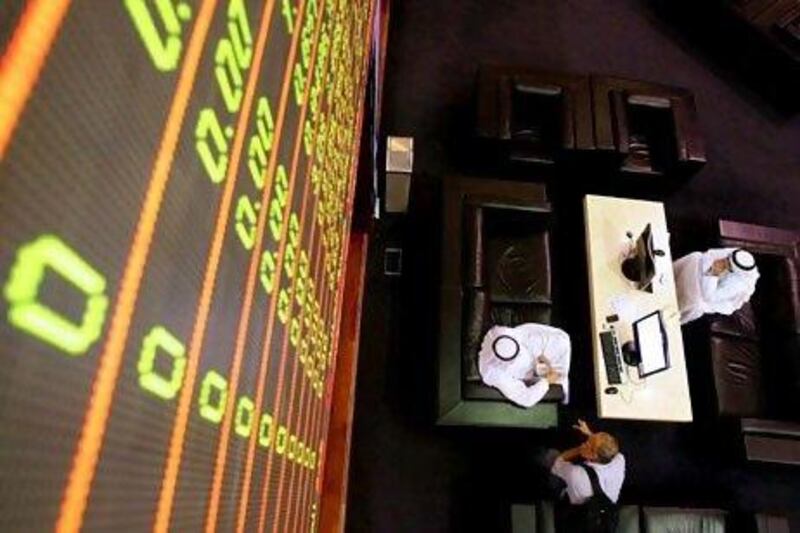The introduction of margin trading in the nation's stock markets will likely increase volumes, but more needs to be done to implement other important investment tools, such as the recently introduced short-selling, analysts say.
"Margin [trading] itself is not the medicine, by itself. It's not going to restore financial health to the overall system," said Anastasios Dalgiannakis, the head of institutional sales trading at Mubasher Financial Services in Dubai.
"It is nothing else than providing leverage to investors to trade in the short term. But to see long-term impact, we need more robust improvements."
The regulator has accredited five companies with margin trading licences so far this year.
Many brokerages previously provided unregulated loans to investors. These investors then used the funds, particularly during the boom years, to trade larger volumes of shares. But when markets collapsed following the global financial crisis, many investors had trouble repaying their debt.
Nor did they, in many cases, return to the market as active traders. One consequence of this lower activity is that there are 50 brokerages in operation today, down from 103 two years ago.
Brokerages have registered impairments valued at Dh380 million (US$103m), according to financial statements posted on the regulator's website. That figure is slightly down from Dh390m last year.
"Customers demanded high levels of leverage and brokerages accepted because of greed. They thought they were reading the market properly until markets crashed. Ever since, brokerages have been throwing good money at bad money," said Wadah Al Taha, the chief investment officer at Al Zarooni Group, an investment company in Dubai.
Investors and the equity markets were hit by a double whammy last year when the combination of the Arab Spring uprisings and the European debt crisis precipitated a fall in stock prices, triggering margin calls and exacerbating the problem of leveraged investing.
"Margin has two side effects: it increases volatility, so in adverse conditions it forces margin calls. Secondly, the turnover caused by margin [trading] itself is not an investment turnover but speculative turnover. It's a tool, but not a solution to the problem," Mr Dalgiannakis said.
Brokerages, particularly small independent ones, must raise funds from banks in order to extend margin services to clients.
"In today's circumstances, brokerages are weak financially," Mr Al Taha said.
"Margin trading requires arrangements with banks, which are no longer there. Where else would they get the money?"
Along with regulated margin trading, other developments in the equity markets augur well for local bourses. The UAE's equity markets are classified as long-only markets, where investors can only buy or sell shares in local companies.
But now, the market regulator has introduced new measures such as short-selling, which have been much anticipated by the industry.
In a "short" sale, an investor borrows a block of stocks for a set period, paying a small amount of interest for the privilege.
He then immediately sells the stock and pockets the proceeds. If the stock's price declines, he can buy back the same amount of shares he borrowed, but at a lower price, pocketing the difference. But even though in theory it violates the law, in practice short selling occurs frequently.
"Short selling exists in the shadow, behind the scene," Mr Al Taha said. "It's not regulated, and those who practised it were violating the regulations." Because it has been unregulated, the practice attracted only a few investors who could pay an expensive premium or spread from international investment banks.
While the Securities and Commodities Authority's new rules for short-selling are welcome, technical questions on how to put them into practice will need to be sorted out before their effects can be felt.
The result could be new institutional investors, as the changes will allow for the flexibility to use derivatives, such as options and futures.
"The derivatives market, futures and options, would be a stabiliser for our markets", said Mr Dalgiannakis. "For me, this law is important, it needs to be properly calibrated, and it could mean, for the first time in our market, we could have bigger participation from institutional investors, more trading and less volatility."





